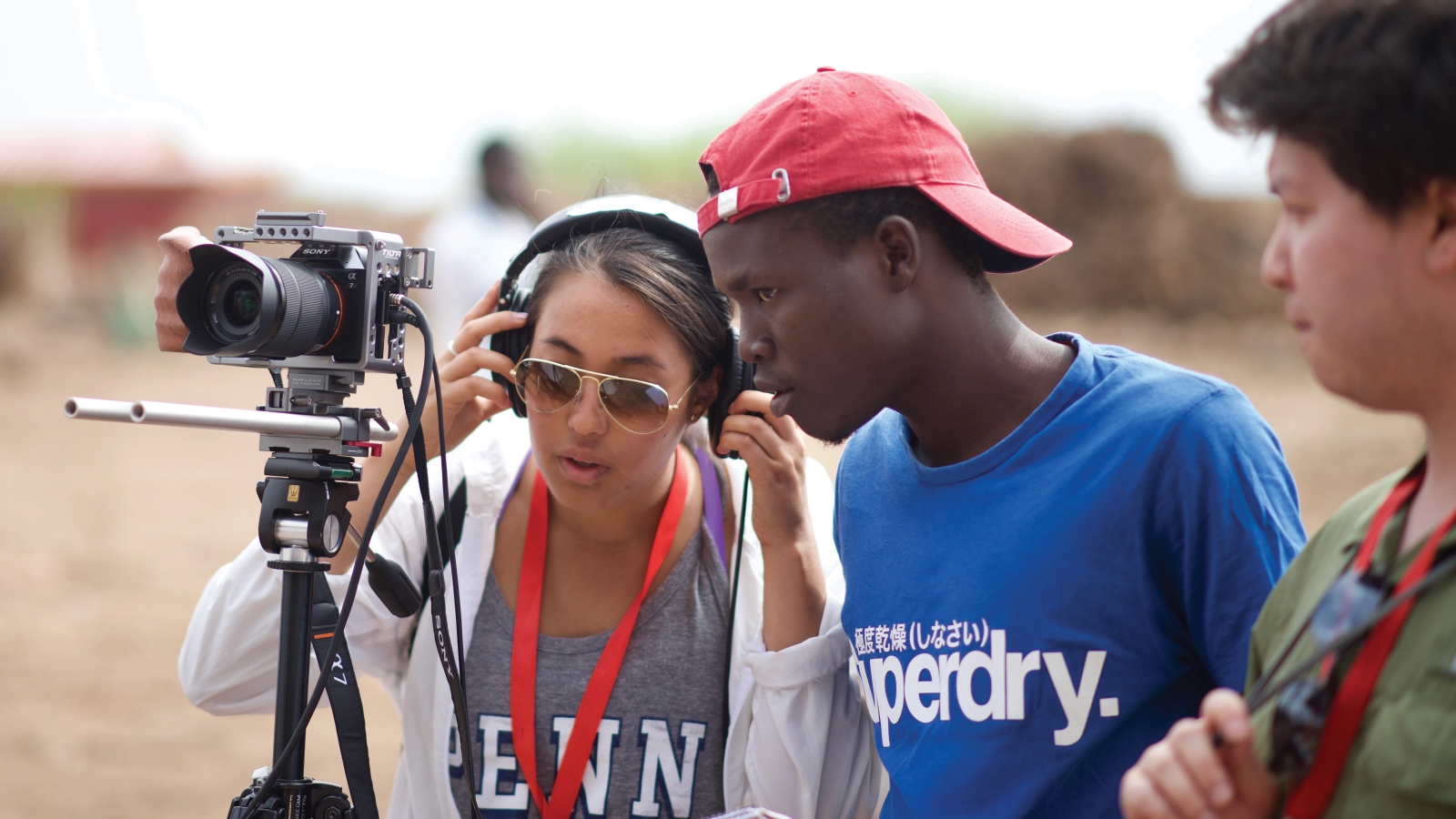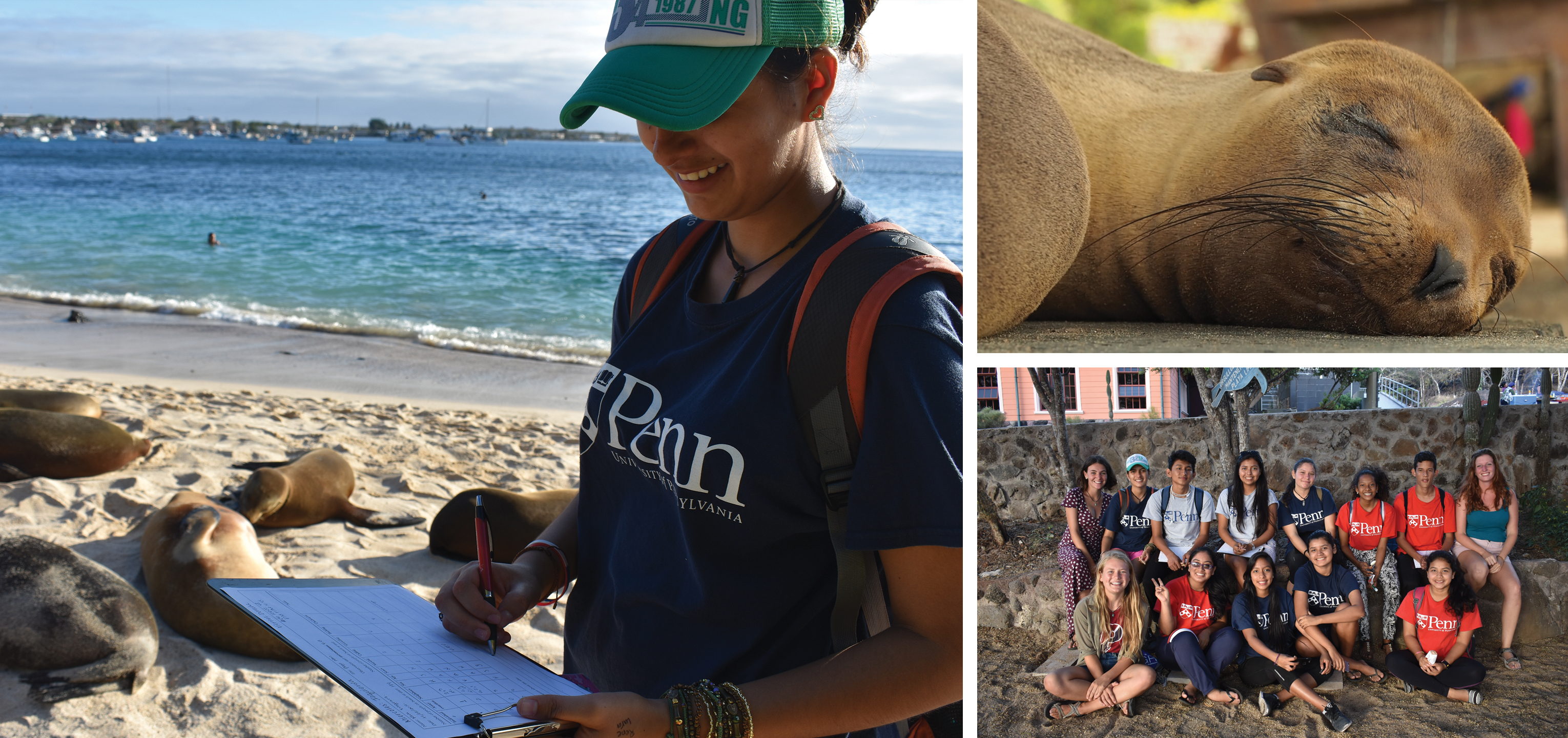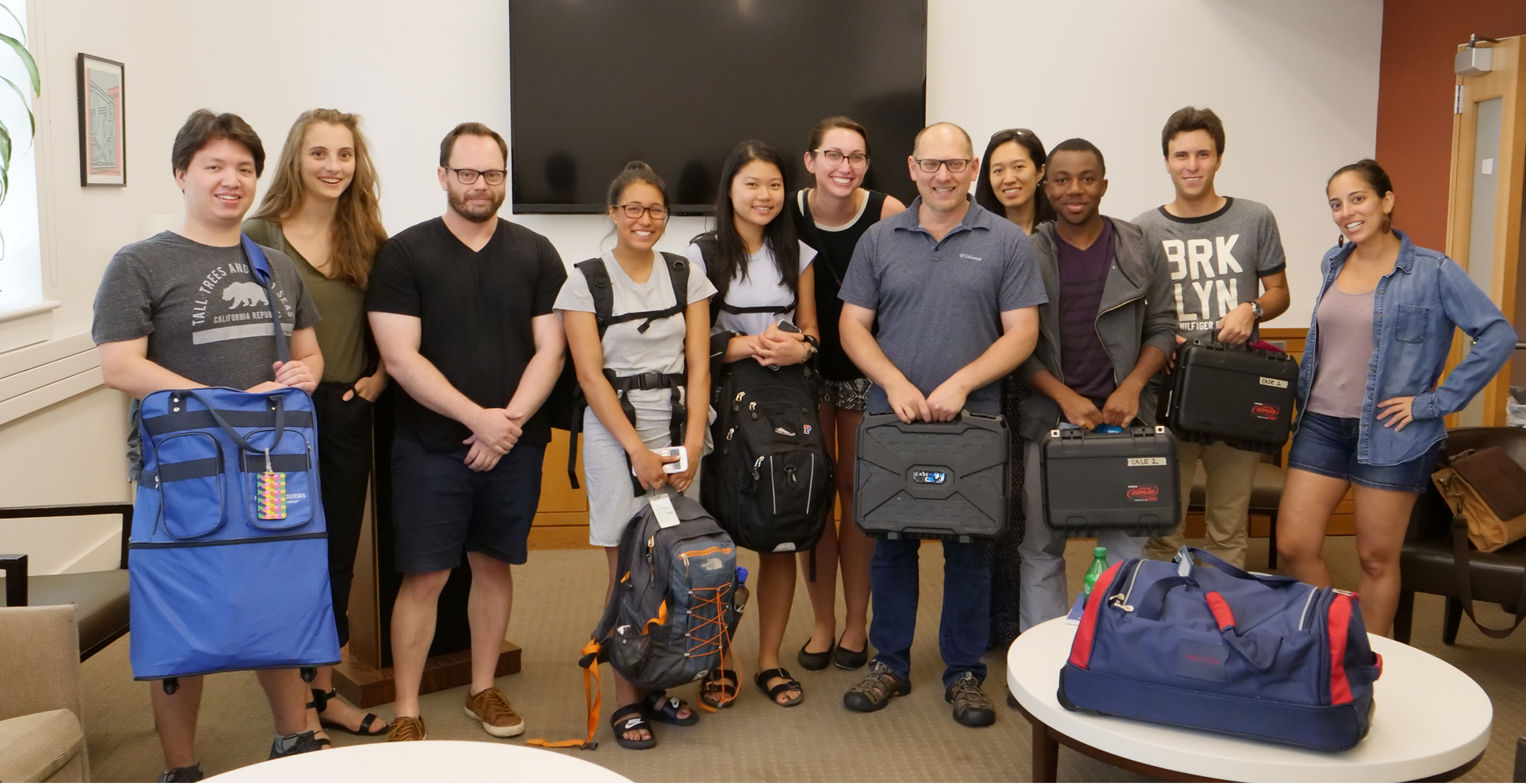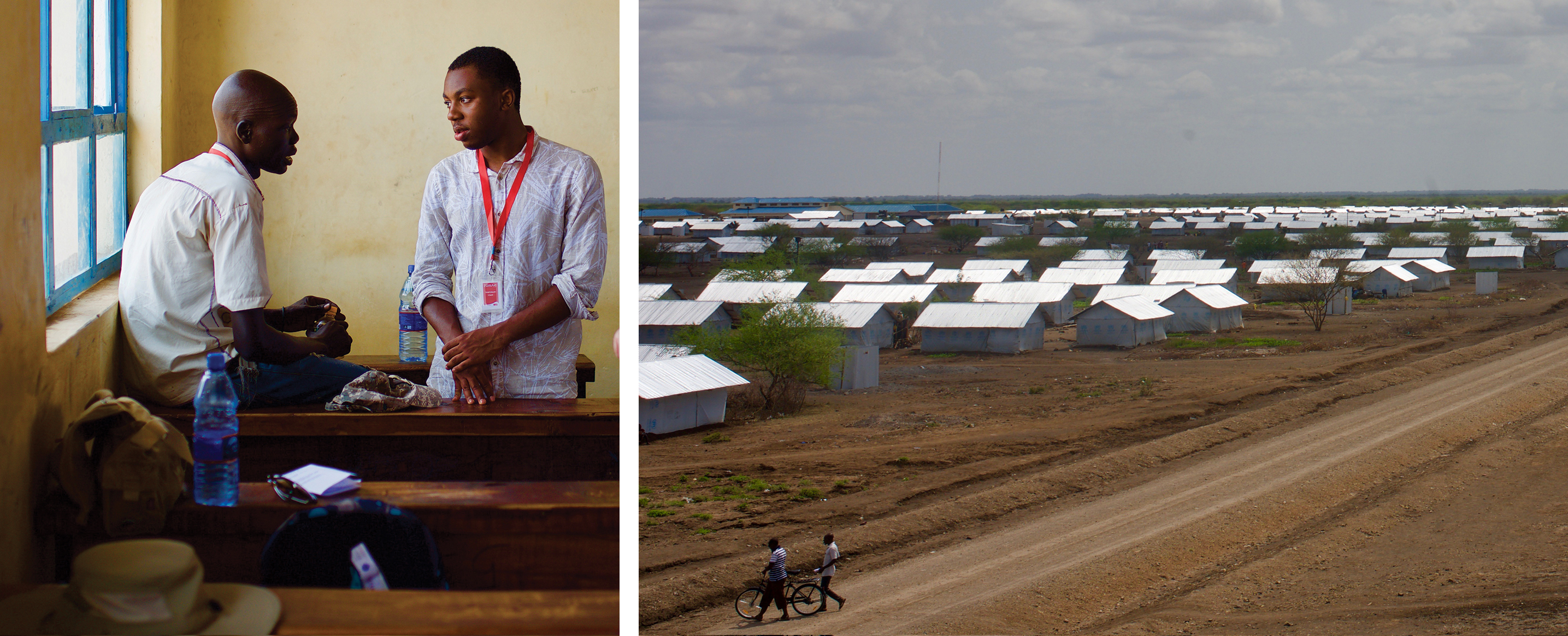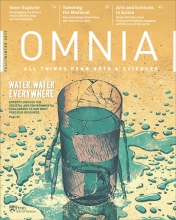Conceived by Ben Franklin to teach all things useful and ornamental, Penn Arts and Sciences celebrates learning for its own sake—and then puts it into action. Now, two initiatives launched by Steven Fluharty, Dean and Thomas S. Gates, Jr. Professor of Psychology, Pharmacology, and Neuroscience, are supporting that action in places ranging from West Philly to Kenya, India, and the Galápagos Islands.
“Different fields look at the world in different ways, and the methods and perspectives of many specialties are needed to address the complex challenges the world faces,” says Fluharty. “We’ve created funding for projects that engage our faculty and energize collaboration between disciplines to take on some big issues.”
This spring, the School awarded four Global Inquires grants to encourage the collective investigation of global topics in areas from child poverty to race, science, and society. Five Making a Difference in Diverse Communities grants are supporting teams of faculty and students in initiatives that combine coursework, research, and service.
The projects are underway. Faculty and students are conducting research, holding conferences, and collaborating with community members. We checked in on four projects to report on the progress already made.
Stewarding the Galápagos
The island of San Cristóbal, Galápagos, is home to about 8,000 people. But it’s also home to many of the planet’s remaining endangered Galápagos sea lions. As the island’s population has grown, the influx of humans has forced the sea lions into smaller and smaller areas. They have taken to chasing children off beaches and sleeping on fishing boats. The people, in turn, are using controversial methods to disperse the animals. It’s a new tension between two groups normally not at odds.
Michael Weisberg, Professor and Chair of the Department of Philosophy, and colleagues have set a plan in motion that involves local Galapagueño guides and high school students, Penn undergraduates, and Penn graduate students. This summer, the Laboratorio Para Apreciar La Vida y El Ambiente (LAVA), supported by Making a Difference in Diverse Communities, took faculty and students to San Cristóbal. There they established a community science initiative where local students researched human-induced changes to the behavior and social structure of the sea lions. In the project’s next phase, the Penn team will work with the high schoolers to promote ecological literacy and empower local residents to be educators and stewards of the islands—improving the relations between Galapagueños and these urban sea lions.
“We wanted to develop a project at the intersection of education, science, and conservation, and the idea of studying urban sea lions came from the San Cristóbal community. We hope our work challenges the unfortunate local idea that conservation and science are just for outsiders,” Weisberg says. “Science and conservation can benefit everyone, and the Galapagueño high school students are already changing perceptions in their community.”
Co-director of the LAVA project is Deena Weisberg, a senior fellow in Psychology. Erol Akçay and Tim Linksvayer, both assistant professors of biology, and Karen M’Closkey, an associate professor of landscape architecture in PennDesign also assist this project and are developing several additional Galápagos initiatives supported by Making a Difference.
To view field reports written by Galapagueño students, Penn students, and Penn faculty, visit: web.sas.upenn.edu/galapagos
Neuroscience and Poverty
For a child growing up in poverty, making a better life is not just a matter of working hard. Studies by Martha Farah, Walter H. Annenberg Professor in the Natural Sciences in the Department of Psychology, have documented that poverty affects not only a child’s day-to-day life but the development of his or her body and mind. Children raised in poverty are less likely to develop strong learning and memory abilities, and research by Kim Noble, C’98, GR’05, M’07, a former graduate student of Farah’s, has shown that these effects are independent of race and ethnicity. The biggest differences are between the poor and the very poor.
“A little bit of stress is inevitable and probably healthy, but unrelenting severe stress, which is common in poor families, is neurotoxic,” says Farah, the founder of Penn’s Center for Cognitive Neuroscience and the Center for Neuroscience and Society.
Farah is leading The Global Problem of Child Poverty: Can Neuroscience Help?, one of the Dean’s Global Inquiries programs. She and her colleagues are trying to answer two major questions: Can the results of research already done be generalized beyond high-income countries like the U.S. to low- and middle-income countries, and how can the scientific knowledge be applied to policy?
“A little bit of stress is inevitable and probably healthy, but unrelenting severe stress, which is common in poor families, is neurotoxic.” – Martha Farah, Walter H. Annenberg Professor in the Natural Sciences in the Department of Psychology
The group has already held a one-day workshop on neuroscience and policy that created a forum for people across Penn to share ideas and approaches and developed relationships among students and faculty. A larger conference next year will include leading neuroscientists and global policy experts and have public sessions.
Collaborators include Sebastian Lipina, a poverty researcher who heads a laboratory in Argentina’s national center for science and technology and spent the summer at Penn; Jere Behrman, Williams R. Kenan, Jr. Professor of Economics and Sociology; Petra Todd, Edmund J. and Louise W. Kahn Term Professor of Economics; Allyson Mackey, Assistant Professor of Psychology; and Sharon Wolf, Assistant Professor of Education.
To read more about Martha Farah and her research, visit: default/story/neuro-pathway
Getting the Lead Out
Lead in the water in Flint. Lead in the soil in Philadelphia. Lead and its impact on health have been in the news across the U.S.
Lead is a powerful neurotoxin that targets young children and adversely impacts their developing brains. Over time, exposure to even minimal amounts impairs cognitive development and may cause lifelong behavioral and social impacts. With a Making a Difference in Diverse Communities grant, a team led by Reto Gieré and Richard Pepino of the Department of Earth and Environmental Science is trying to develop solutions that can work in every community.
The Reducing Lead Exposure: Testing a Nationally Replicable University-Municipal-Community Partnership program is being piloted in Philadelphia and 80 miles west, in Lancaster, Pa. Student groups have begun working in both communities to test the amounts of lead in soil and map the results. More importantly, they are forming partnerships with schools and community groups to test homes, share information, and teach about environmental justice. Penn is also working with the Philadelphia Water Department to turn city water main replacement into a chance to urge residents to update their individual lead pipes for free.
“An important component of environmental research is that we go out to the communities and tell them about our results, good or bad,” says Gieré. “I think it’s especially important to reach out to the young people via the schools. Because the kids act as multipliers. They bring it home.”
“An important component of environmental research is that we go out to the communities and tell them about our results, good or bad. I think it's especially important to reach out to the young people via the schools. Because the kids act as multipliers. They bring it home.” – Reto Gieré, Professor and Chair of Earth and Environmental Science
Besides Gieré, Professor and Chair of Earth and Environmental Science, and Pepino, Deputy Director of the Community Outreach and Engagement Core of the Center of Excellence in Environmental Toxicology of the Perelman School of Medicine, the project’s faculty leaders include Trevor Penning, Molinoff Professor of Pharmacology and Biochemistry and Biophysics in the Perelman School of Medicine; Ira Harkavy, Director, Netter Center for Community Partnerships; Marilyn Howarth, an adjunct associate professor of emergency medicine and pharmacology in Perelman; and Howard Neukrug, Practice Professor of Earth and Environmental Science.
To hear a podcast on this project, visit: default/story/omnia-podcast-reducing-lead-exposure-audio
Rewriting The Script
More than 150,000 North African refugees and asylum-seekers live in Kenya’s Kakuma Refugee Camp and the adjacent Kalobeyei Settlement. The majority of them have arrived since 2013, fleeing the ongoing civil war in South Sudan.
This summer, Penn students journeyed to Kenya to make documentary films with residents of the camp and settlement, supported by a Making a Difference in Diverse Communities grant. The Penn-in-Kenya summer abroad course was created and led by Peter Decherney, Professor of Cinema and Media Studies and English, in partnership with FilmAid International, a nonprofit that works to use the power of media to inform, educate, and empower refugees around the world.
The students prepared with a “boot camp” at Penn, hearing from experts on African history, politics, and the refugee crisis, and even learning some Swahili. Upon arrival in Kenya, they met their collaborators: young-adult students in the refugee camp who had had completed FilmAid training on film production.
The Penn students taught workshops in screenwriting, social media, sound, music composition, and virtual reality filming. They then teamed up in pairs with the student refugees and FilmAid staff to make six short documentaries. The films will provide information for new arrivals to the Kalobeyei Settlement on education, food distribution, health, water and sanitation, security, and protection.
“There was a partnership while filming the documentaries,” Decherney says. “I was happy that we had a real purpose and that we were creating something that was going to be used by thousands of people very soon.”
Now back on campus, the Penn students are putting together an exhibit at the Perry World House on November 7.
The project’s other faculty directors are Carolyn Cannuscio, Assistant Professor of Family Medicine and Community Health, and John Jackson, Jr., Dean of the School of Social Policy and Practice and Richard Perry University Professor, who also has appointments in anthropology and the Annenberg School for Communication.
To see the daily blog kept during the trip, visit: penninkakumakenya.wordpress.com
